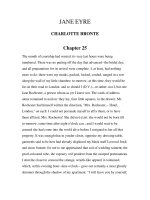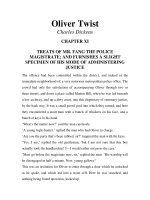LUYỆN ĐỌC TIẾNG ANH QUA TÁC PHẨM VĂN HỌC-JANE EYRE CHARLOTTE BRONTE Chapter 31
Bạn đang xem bản rút gọn của tài liệu. Xem và tải ngay bản đầy đủ của tài liệu tại đây (30.08 KB, 11 trang )
JANE EYRE
CHARLOTTE BRONTE
Chapter 31
My home, then, when I at last find a home,--is a cottage; a little room with
whitewashed walls and a sanded floor, containing four painted chairs and a
table, a clock, a cupboard, with two or three plates and dishes, and a set of
tea-things in delf. Above, a chamber of the same dimensions as the kitchen,
with a deal bedstead and chest of drawers; small, yet too large to be filled
with my scanty wardrobe: though the kindness of my gentle and generous
friends has increased that, by a modest stock of such things as are necessary.
It is evening. I have dismissed, with the fee of an orange, the little orphan
who serves me as a handmaid. I am sitting alone on the hearth. This
morning, the village school opened. I had twenty scholars. But three of the
number can read: none write or cipher. Several knit, and a few sew a little.
They speak with the broadest accent of the district. At present, they and I
have a difficulty in understanding each other's language. Some of them are
unmannered, rough, intractable, as well as ignorant; but others are docile,
have a wish to learn, and evince a disposition that pleases me. I must not
forget that these coarsely-clad little peasants are of flesh and blood as good
as the scions of gentlest genealogy; and that the germs of native excellence,
refinement, intelligence, kind feeling, are as likely to exist in their hearts as
in those of the best-born. My duty will be to develop these germs: surely I
shall find some happiness in discharging that office. Much enjoyment I do
not expect in the life opening before me: yet it will, doubtless, if I regulate
my mind, and exert my powers as I ought, yield me enough to live on from
day to day.
Was I very gleeful, settled, content, during the hours I passed in yonder bare,
humble schoolroom this morning and afternoon? Not to deceive myself, I
must reply--No: I felt desolate to a degree. I felt--yes, idiot that I am--I felt
degraded. I doubted I had taken a step which sank instead of raising me in
the scale of social existence. I was weakly dismayed at the ignorance, the
poverty, the coarseness of all I heard and saw round me. But let me not hate
and despise myself too much for these feelings; I know them to be wrong- -
that is a great step gained; I shall strive to overcome them. To- morrow, I
trust, I shall get the better of them partially; and in a few weeks, perhaps,
they will be quite subdued. In a few months, it is possible, the happiness of
seeing progress, and a change for the better in my scholars may substitute
gratification for disgust.
Meantime, let me ask myself one question--Which is better?--To have
surrendered to temptation; listened to passion; made no painful effort--no
struggle;--but to have sunk down in the silken snare; fallen asleep on the
flowers covering it; wakened in a southern clime, amongst the luxuries of a
pleasure villa: to have been now living in France, Mr. Rochester's mistress;
delirious with his love half my time--for he would--oh, yes, he would have
loved me well for a while. He DID love me--no one will ever love me so
again. I shall never more know the sweet homage given to beauty, youth,
and grace--for never to any one else shall I seem to possess these charms. He
was fond and proud of me--it is what no man besides will ever be.--But
where am I wandering, and what am I saying, and above all, feeling?
Whether is it better, I ask, to be a slave in a fool's paradise at Marseilles--
fevered with delusive bliss one hour- -suffocating with the bitterest tears of
remorse and shame the next- -or to be a village-schoolmistress, free and
honest, in a breezy mountain nook in the healthy heart of England?
Yes; I feel now that I was right when I adhered to principle and law, and
scorned and crushed the insane promptings of a frenzied moment. God
directed me to a correct choice: I thank His providence for the guidance!
Having brought my eventide musings to this point, I rose, went to my door,
and looked at the sunset of the harvest-day, and at the quiet fields before my
cottage, which, with the school, was distant half a mile from the village. The
birds were singing their last strains -
"The air was mild, the dew was balm."
While I looked, I thought myself happy, and was surprised to find myself ere
long weeping--and why? For the doom which had reft me from adhesion to
my master: for him I was no more to see; for the desperate grief and fatal
fury--consequences of my departure--which might now, perhaps, be
dragging him from the path of right, too far to leave hope of ultimate
restoration thither. At this thought, I turned my face aside from the lovely
sky of eve and lonely vale of Morton--I say LONELY, for in that bend of it
visible to me there was no building apparent save the church and the
parsonage, half-hid in trees, and, quite at the extremity, the roof of Vale
Hall, where the rich Mr. Oliver and his daughter lived. I hid my eyes, and
leant my head against the stone frame of my door; but soon a slight noise
near the wicket which shut in my tiny garden from the meadow beyond it
made me look up. A dog--old Carlo, Mr. Rivers' pointer, as I saw in a
moment--was pushing the gate with his nose, and St. John himself leant
upon it with folded arms; his brow knit, his gaze, grave almost to
displeasure, fixed on me. I asked him to come in.
"No, I cannot stay; I have only brought you a little parcel my sisters left for
you. I think it contains a colour-box, pencils, and paper."
I approached to take it: a welcome gift it was. He examined my face, I
thought, with austerity, as I came near: the traces of tears were doubtless
very visible upon it.
"Have you found your first day's work harder than you expected?" he asked.
"Oh, no! On the contrary, I think in time I shall get on with my scholars very
well."
"But perhaps your accommodations--your cottage--your furniture--have
disappointed your expectations? They are, in truth, scanty enough; but--" I
interrupted -
"My cottage is clean and weather-proof; my furniture sufficient and
commodious. All I see has made me thankful, not despondent. I am not
absolutely such a fool and sensualist as to regret the absence of a carpet, a
sofa, and silver plate; besides, five weeks ago I had nothing--I was an
outcast, a beggar, a vagrant; now I have acquaintance, a home, a business. I
wonder at the goodness of God; the generosity of my friends; the bounty of
my lot. I do not repine."
"But you feel solitude an oppression? The little house there behind you is
dark and empty."
"I have hardly had time yet to enjoy a sense of tranquillity, much less to
grow impatient under one of loneliness."
"Very well; I hope you feel the content you express: at any rate, your good
sense will tell you that it is too soon yet to yield to the vacillating fears of
Lot's wife. What you had left before I saw you, of course I do not know; but
I counsel you to resist firmly every temptation which would incline you to
look back: pursue your present career steadily, for some months at least."
"It is what I mean to do," I answered. St. John continued -
"It is hard work to control the workings of inclination and turn the bent of
nature; but that it may be done, I know from experience. God has given us,
in a measure, the power to make our own fate; and when our energies seem
to demand a sustenance they cannot get--when our will strains after a path
we may not follow--we need neither starve from inanition, nor stand still in
despair: we have but to seek another nourishment for the mind, as strong as
the forbidden food it longed to taste--and perhaps purer; and to hew out for
the adventurous foot a road as direct and broad as the one Fortune has
blocked up against us, if rougher than it.
"A year ago I was myself intensely miserable, because I thought I had made
a mistake in entering the ministry: its uniform duties wearied me to death. I
burnt for the more active life of the world- -for the more exciting toils of a
literary career--for the destiny of an artist, author, orator; anything rather
than that of a priest: yes, the heart of a politician, of a soldier, of a votary of









